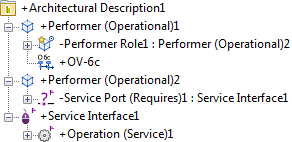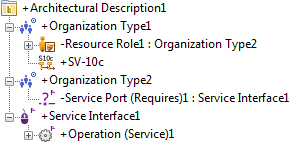Operation (service) (UPDM - DoDAF aliases)

Creation
To create an Operation (Service):
• From a Service Interface: right-click the Service Interface, point to New, point to DoDAF, and then click Operation (Service).
• From an SOV-1 Service Taxonomy or SOV-2 Service Interface Specification: click the  Operation (Service) button, and then click the owning Service Interface.
Operation (Service) button, and then click the owning Service Interface.
 Operation (Service) button, and then click the owning Service Interface.
Operation (Service) button, and then click the owning Service Interface.
Operation (Service) Reply Message button, in line with the required Statement click the source lifeline, and then click the destination lifeline.
When you create an Operation (Service) message, you are prompted to select the Operation (Service) you want to call. The available Operation (Service) elements are those Operation (Service) elements that are available through Service Port (Requires) and Service Port (Provides) ports.
In the following example, Performer Role1 appears on the OV-6c Operational Event-Trace Description. When Performer Role1 is the target of an Operation (Service) Message, Operation (Service)1 is available for selection.

Operation (Service)1 is available because the type of Performer Role1 is Performer (Operational)2; Performer (Operational)2 owns the port Service Port (Requires)1; the type of Service Port (Requires)1 is Service Interface1; and Service Interface1 owns Operation (Service)1.

 Operation (Service) Reply Message button, in line with the required Statement click the source lifeline, and then click the destination lifeline. From the Select Operation (Service) dialog, select or create the Operation (Service) you want to call.
Operation (Service) Reply Message button, in line with the required Statement click the source lifeline, and then click the destination lifeline. From the Select Operation (Service) dialog, select or create the Operation (Service) you want to call.• From an SV-10c Systems Event-Trace Description, click the  Operation (Service) Message or
Operation (Service) Message or  Operation (Service) Reply Message button, in line with the required Statement click the source lifeline, and then click the destination lifeline.
Operation (Service) Reply Message button, in line with the required Statement click the source lifeline, and then click the destination lifeline.
 Operation (Service) Message or
Operation (Service) Message or  Operation (Service) Reply Message button, in line with the required Statement click the source lifeline, and then click the destination lifeline.
Operation (Service) Reply Message button, in line with the required Statement click the source lifeline, and then click the destination lifeline.When you create an Operation (Service) message, you are prompted to select the Operation (Service) you want to call. The available Operation (Service) elements are those Operation (Service) elements that are available through Service Port (Requires) and Service Port (Provides) ports.
In the following example, Resource Role1 appears on the SV-10c Systems Event-Trace Description. When Resource Role1 is the target of an Operation (Service) Message, Operation (Service)1 is available for selection.

Operation (Service)1 is available because the type of Resource Role1 is Organization Type2; Organization Type2 owns the port Service Port (Requires)1; the type of Service Port (Requires)1 is Service Interface1; and Service Interface1 owns Operation (Service)1.

Appearance
When shown on an SOV-1 Service Taxonomy or SOV-2 Service Interface Specification, an Operation (Service) appears as follows:

When shown on an SOV-4b Service State Model, an Operation (Service) appears as a Do Operation (Service) call:

When shown on an OV-6c Operational Event-Trace Description, SOV-4c Service Interaction Specification or SV-10c Systems Event-Trace Description, an Operation (Service) appears as an Operation (Service) message:

Relationships
The following relationships are of importance to an Operation (Service):
• Atomic State (Service), Concurrent State (Service) or Sequential State (Service) elements can call an Operation (Service) through a Do Operation (Service) call.
• An Operation Action (Service) can invoke an Operation (Service).
• Through an OV-6c Operational Event-Trace Description you can create Operation (Service) messages that can call Operation (Service) elements.
The following sections provide information about how an Operation (Service) is used in the model.
Create an Operation (Service) from
Create from an Operation (Service)
In addition to the UPDM elements that can be created from all UPDM elements (Representation, Definition, Information, and Metadata):
Shown on these diagrams, tables and matrices
In addition to the AV-2 Integrated Dictionary and StdV-1 Standards Profile, which can show all UPDM elements:
UPDM writeable properties
The following writeable properties are available on the Operation (Service) tab of an Operation (Service) element's Property Pages:
• URI








